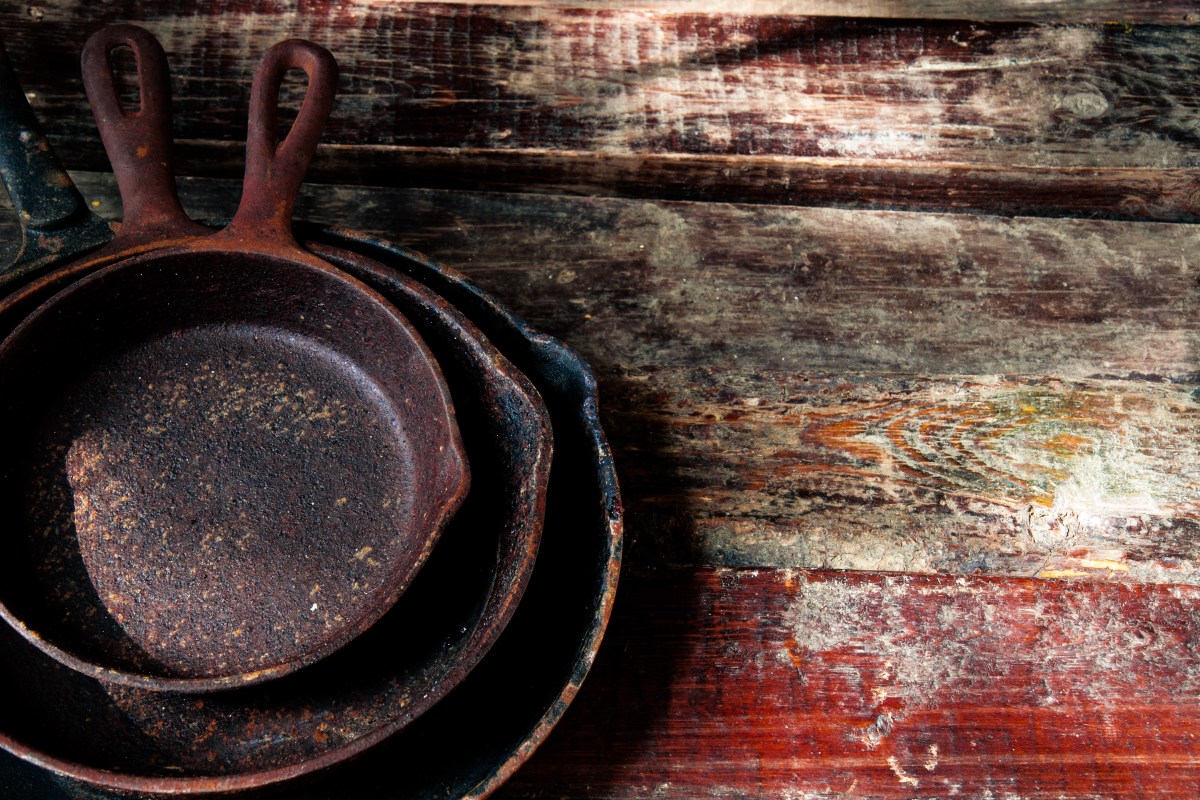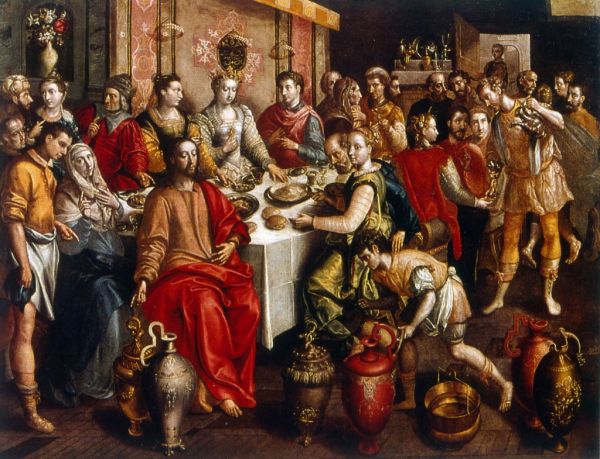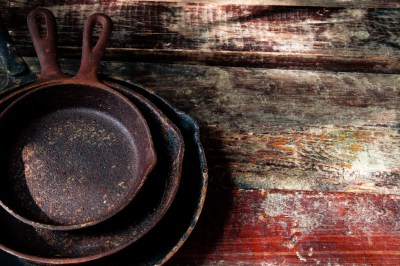Hello and happy Thanksgiving (even if belated)! I hope your food was good and plentiful, and the time with loved ones has been rewarding. And for those for whom the holidays are not so easy, that you still experienced care from others.
The main essay of each edition of Dispatch Faith up to this point has typically been written by a contributor outside of The Dispatch. One of the things I enjoy about putting this newsletter together each week (and hope you enjoy it too) is featuring different voices and perspectives. This week, though, reflections that have been percolating in my own head for most of this year spilled over into the essay below. My hope is that it’s a sufficient capstone to a weekend in which we give much thanks, but that it also is worth remembering far beyond this one holiday.
In any event, I do want to say thank you, dear reader, for spending your time with this newsletter and with The Dispatch in general. We all are sincerely grateful. We are still getting the word out about the ability to upgrade your membership to Dispatch Premium. In addition to total access to all of our content, a Dispatch Premium membership includes two giftable annual memberships, ad-free listening and reading, exclusive access to events, and extra opportunities to interact directly with Dispatch reporters and staff. You can still use the code BLACKFRIDAY to take $25 off a premium membership
On Rootedness and Thanksgiving

Lying flat on my back with my arm outstretched on a vinyl table in a tattoo parlor in Boca Raton, Florida, would have been one of the last places I’d have imagined myself. My family of six had gone down from our home in Tennessee to spend a week visiting my younger sister and her family. At some point early in this summer’s trip a conversation between my sister, her husband, my wife, and me turned to tattoos and “What ifs.”
If you know me at all, you know at the surface level I don’t seem the stereotypical tattoo type: a then-36-year-old married man with four kids who drove his family down to Boca in a Honda Odyssey and stayed in an Embassy Suites for the week. Those who know me decently well might be even more surprised that I would get a tattoo seemingly on impulse. That’s because I’m boring: I have a weird, very dad sense of humor, I’m a morning person who only makes it about an hour after the kids’ bedtime each night before collapsing myself, and my favorite flavor of ice cream really is vanilla.
Yet here I was, with my right sleeve pulled up as a thoroughly inked man (highly recommended by my brother-in-law) held his tattoo pen against my inner bicep and studded beads of ink into my flesh. It had only taken a few (mostly) gentle nudges from my wife, sister, and brother-in-law to get me to take the plunge—especially after I told them about the tattoo I had in mind. When it was done, I held up my arm and—in one of those moments of simultaneous relief and mortification—looked down, happy to see the result: a cast iron skillet.
I had worried that it would have been a stupid tattoo to get. Or random, or weird, or perhaps a little too fitting for a guy approaching middle age and carrying too much weight who does a lot of cooking at home. But it isn’t just any cast iron skillet. It was a pleasingly detailed reproduction of one of my mother’s cast iron skillets—down to the numeral 8 on the handle—that she had inherited after my grandmother died nearly 30 years ago (28 years ago today, actually). Seeing it is a reminder of Mom, of Mammaw (J.D. Vance isn’t the only one who had one of those)—and of my roots. My growing up years in East Tennessee were thoroughly suburban, but my parents and their parents and their kin were thoroughly Appalachian. The skillet is obviously a reminder of food prepared for and enjoyed with family. Putting a meal to table—often cooked in a cast iron skillet—was something I saw my mother and grandmother do over and over again and something I heard of my great- and great-great grandparents doing.
But the skillet is also a reminder of the sort of matriarchal strength my mother and grandmothers (on both sides of my family) exhibited when met with pain and loss and grief and the ugliness the world sometimes presents. When cousins needed a safe place to stay because their parents were in a drunken (sometimes violent) fight, it was my mother and grandmother who snatched them up and brought them home. When my cancer-stricken, bedridden grandfather needed around-the-clock care, it was my mother and grandmother who saw to his needs. When Mammaw died and my grandfather still needed that care, it was Mom who made sure he got it while bearing the burden of keeping his financial affairs in order (even with a husband and two young kids). It was them sometimes gluing our extended family together amid the same kind of dysfunction Vance himself wrote about in Hillbilly Elegy. (Maybe it is an Appalachian thing.)
If Thanksgiving is about gratitude, it is necessarily about remembering what has passed to make us grateful in the present. George Washington dedicated a national day of thanksgiving “to the service of that great and glorious Being, who is the beneficent Author of all the good that was, that is, or that will be,” he wrote (emphasis mine). The past tense (our shared and individual history) is something we should be grateful for now.
The cast iron skillet on my arm I suppose is my way of remembering those signal and manifold mercies evident in where and to whom I am rooted. Yet if Jonah is right that Thanksgiving is about home, I suppose that image of a skillet on my arm reminds me of all that home is for me and how it got to be so, but also what I hope one day, presuming upon the same “favorable interpositions of [God’s] Providence” Washington referred to. Maybe for my own kids the sensory details will be the same—we do a lot of cooking in my own cast iron skillet too—but maybe they won’t. What’s more important to me is that they have some sense of understanding of their roots—of God’s signal and manifold mercies in their own lives.
Of course the stories of the Abrahamic faiths are shot through with such remembering—sometimes painfully so. The book of Ezra tells of a remnant of Jews returning to Jerusalem from their Babylonian exile, hoping for their covenant-keeping God to act but living in the shadows of their own failures. By this time in its history, the story of God’s people had played out in cycles: receiving provision and goodness from God, forgetting or rejecting such provision and the accompanying obligations, the curse and consequences for those lapses, followed by more mercy and provision from God. Continually, God calls on his people to remember him and his goodness. In Chapter 3 of Ezra, the Jews who have returned are rebuilding the altar of the temple that had been destroyed, and celebrating the Festival of Booths—itself a remembrance of God delivering his people out of Egypt and through the wilderness, eventually to the promised land of Canaan. Then they begin reconstruction of the foundation of the temple. Some of those who took to rebuilding the temple were old enough to remember the days before their exile and the splendor of the first temple as they worked to reconstruct something that, in their minds, failed to compare.
And all the people shouted with a great shout when they praised the LORD, because the foundation of the house of the LORD was laid. But many of the priests and Levites and heads of fathers’ houses, old men who had seen the first house, wept with a loud voice when they saw the foundation of this house being laid, though many shouted aloud for joy, so that the people could not distinguish the sound of the joyful shout from the sound of the people’s weeping, for the people shouted with a great shout, and the sound was heard far away.
What resonates with me is the realization that rootedness is being grateful both for the blessings and deliverances but also moved by failings and grief: shouts of joy mingled with groans and weeping. God is present in them both.
For whatever reason this desire for rootedness has always been in me, though I credit much of it to my father. Dad was a college history major who wound up providing for his family as a retail manager (his Thanksgivings were always brief and bookended with preparing that year’s doorbuster sales and blue-light specials), but he has never stopped studying history. For my sister and me as kids, this meant even trips to Disney World involved a historical stop or two along the way. (Andersonville isn’t that far off of I-75!) But it also meant lots of time with Dad in old country cemeteries looking for graves of relatives so that he could fill out our genealogical details in full. Or scrolling through digitized census records for bits of information—or sometimes even thumbing through boxes of yellowed records in courthouse basements.
More than a decade after my wife and I were married, Dad began digging into her side of the family, specifically my father-in-law’s tree. During the COVID pandemic in 2020, he began sending me cryptic text messages about how excited he was about his discoveries. They culminated in a two-volume history of my father-in-law’s family, presented to him at that year’s Thanksgiving gathering at my house. Dad had tracked down my father-in-law’s roots all the way back to his ninth great-grandfather, Stephen Hopkins, who had been at Jamestown and made his way to Plymouth with the pilgrims aboard the Mayflower, and is thought even to have inspired a character, Stephano, in Shakespeare’s The Tempest. Another great-grandfather of a different branch, George Morton, was instrumental in getting the pilgrims to Plymouth Colony and its later success. The writings of George’s son, Nathaniel, are featured each Thanksgiving in the opinion pages of the Wall Street Journal, chronicling what the pilgrims endured. Another relative of the same line of Mortons—Levi P. Morton—would eventually become the governor of New York, serve as vice president under President Benjamin Harrison, and sign the deed to accept the Statue of Liberty from the French on July 4, 1884.
My father-in-law, Rob Morton, and his family had been totally unaware of these roots until Dad presented his findings. They included hundreds of pages of meticulous genealogical citations, chronicling generation upon generation. But Dad himself wrote more than a hundred pages of narrative—vignettes of notable individuals such as Hopkins or Levi P. Morton and how they got from point A to point B, struggles and accomplishments, trials and providence all entwined. It was a huge undertaking—I know because I helped him edit it—to which he devoted months of nights and weekends.
My parents and my in-laws have always had a good relationship, but even as I look back on my father’s work each Thanksgiving since, I’m amazed at his effort (I’m biased, but it’s in pretty darn good prose too). “By understanding our forefathers we shed light on our own circumstances,” Dad wrote to Rob. “The Bible commands us to give honor to those to whom honor is due, to those who have gone before. We need to learn about these forgotten men and women who braved a new world, some of whom were willing to die for our nation. … These people, our people, who have preceded us, do deserve our respect.” He labored so that “our shared grandchildren” and perhaps their grandchildren’s children “might take an interest in knowing something about their varied family roots.”
In that way, I suppose all remembering and thanksgiving is suffused also with expectant hope—much like the Advent season we Christians now find ourselves beginning. For Dad and my father-in-law, it’s the hope that their descendants will know and remember. For me, that a tattooed image of a cast iron skillet will help me to care for my people as my mother and grandmother cared for theirs. For the remnant of Jews who returned to Jerusalem, that God would keep his covenant with them despite their own failures, that the long-awaited messiah would come. That, in the words of the prophet Isaiah, “There shall come forth a shoot from the stump of Jesse, and a branch from his roots shall bear fruit.”
Robert Sirico: Flourishing Is About More Than Just Power

For the website today, Father Robert Sirico writes that this time of year is a natural one for seeking to remember the first principles that have made the United States a hope among the nations—and the current wave of populism too easily forgets. It all goes back ot understanding the human condition.
At the heart of this lies a principle from my own faith tradition but that has parallels in others: subsidiarity. Though the word may sound lofty, subsidiarity is based on the commonsense idea that society is best governed at the most local level possible, at the most proximate level of social organization possible. This principle affirms that higher levels of government should only step in when lower levels—families, communities, local governments—are unable to address a particular issue. This approach protects against centralization and bureaucratic overreach, which often leads to inefficiency and a loss of personal freedom. The subsidium (help or subsidy) aids, it does not replace or absorb society into the state.
Alexis de Tocqueville observed this dynamic in action during his visit to the U.S. in the early 19th century and documented it in Democracy in America. He noted how the principles of decentralization, embodied in the American founding documents like the Federalist Papers, were reflected in the culture that promoted habits of problem-solving. This bottom-up approach fosters accountability and promotes individual freedom, avoiding the pitfalls of centralized planning and the inefficiencies of bureaucratic agencies and centralized planning.
More Sunday Reads
- Appropriately timed, scholar Anthony Bradley has compiled a list of academic research on the benefits of gratitude (with plenty of ties into religion), and helps cut to the bottom line. “Gratitude is not just a virtue; it is a transformative force that builds resilience, fosters emotional intelligence, strengthens relationships, and deepens spiritual well-being. This rich body of research underscores the profound impact gratitude has on individuals, families, and communities,” Bradley writes. “Gratitude, practiced daily, lays the groundwork for a flourishing life. It strengthens families, deepens faith, and equips individuals to thrive in any circumstance. By cultivating this habit early, we empower the next generation to face life with confidence, resilience, and hope.”
- Perhaps a bit off the wall, but this is an interesting read with a unique religion angle. For the New York Times, Franz Lidz reports on how drones and artificial intelligence are helping archaeologists discover new Nazca Lines in Peru—and perhaps get closer to learning the purpose of the massive drawings carved into the desert sands. “The ancient geoglyphs have attracted theories that range from the religious (they were homages to powerful mountain and fertility gods) to the environmental (they were astronomical guides to predict infrequent rains in the nearby Andes) to the fantastical (they were landing strips and parking lots for alien spacecraft). [Archaeologist] Dr. [Masato] Sakai said that geoglyphs were drawn near pilgrimage routes to temples, which implies that they functioned as sacred spaces for community rituals, and could be considered planned, public architecture. The newly discovered geoglyphs are mainly located along a network of trails that wound through the pampa. They were most likely made by individuals and small groups to share information about rites and animal husbandry.”
A Good Word
For Thanksgiving, our own Kevin D. Williamson penned a meditation of Jesus’ first miracle that is worth ruminating on any day of the year (and which put a lump in my throat when I read it). “The miracle at Cana isn’t water becoming wine—any old magician could do that sort of thing. Whatever it was that Jesus was about, it wasn’t stupid party tricks. The miracle is that the Ruler of the Universe cared about such a little thing as the social anxieties of a bunch of nobodies in an obscure little corner of the world of no particular importance, and that He loved them the way a father loves his children—and what kind of father offers just enough at a time like that when he has, at his disposal, the very best? The best robe, the gold ring, the fatted calf, the wine that was better than any wine the local whatever-was-Hebrew-for-sommelier had ever tasted? The supernatural stuff is one thing, but consider the magnificence of that gesture, the sheer audacious style of it. I do not care if you are the most cynical atheist walking the Earth—it is impossible not to admire the panache. He bends reality into a new shape, makes the universe follow new rules, to help out a friend, and He does it cool—nobody even knows what happened except for the waiters. It wasn’t that He did the thing—it was that He did the thing because He loves us like His own children. And He did it knowing that Golgotha was waiting.”






Please note that we at The Dispatch hold ourselves, our work, and our commenters to a higher standard than other places on the internet. We welcome comments that foster genuine debate or discussion—including comments critical of us or our work—but responses that include ad hominem attacks on fellow Dispatch members or are intended to stoke fear and anger may be moderated.
With your membership, you only have the ability to comment on The Morning Dispatch articles. Consider upgrading to join the conversation everywhere.